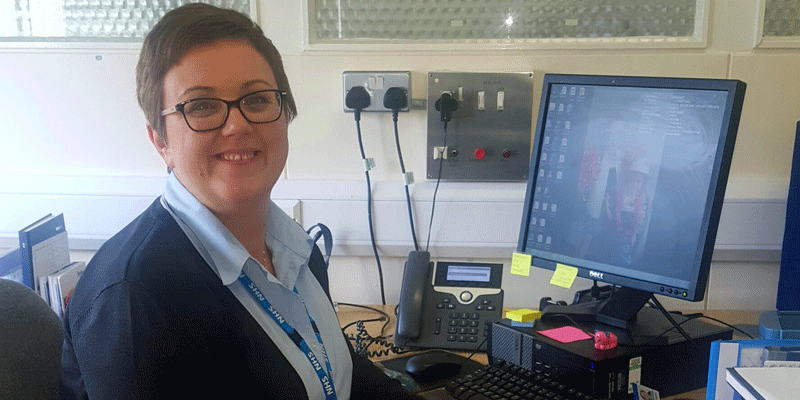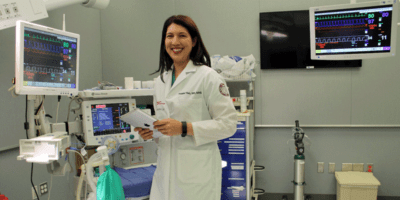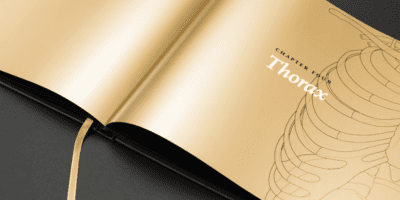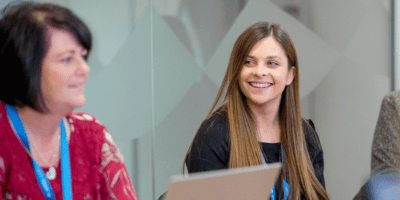Louise Fisher is a wife and mum of two girls, who after working in the NHS for seven years decided on a different career path. She completed a Post Graduate Diploma in Nursing Studies at the University of Sheffield in 2014. After working at Barnsley District Hospital for 15 months Louise moved to a community setting where she currently works as a Long-Term Conditions Staff Nurse for the Care Navigation Team in Barnsley, employed by the South West Yorkshire NHS Foundation Trust.
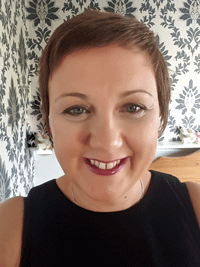
“…I could go on about this forever! I realise this is a cliché, but the best part of my job is knowing I’ve helped someone…”
My career so far and why I chose nursing
I’ve always worked in the public sector, previously in jobs that have involved direct, face-to-face contact with generally vulnerable people. I worked with young offenders in a youth offending service and as a keyworker in a substance misuse service. I chose nursing as it involves many of the skills that I feel are my strengths; communication, advocating for patients, care planning and assessments. Basically, caring is caring, no matter what environment you’re in!
My role on a day to day basis
The purpose of our service is to enable patients with a long-term condition to self-manage their symptoms, and if they do become unwell to intervene early and try to avoid hospital admissions. My first role is monitoring the vital signs of my caseload of patients. Some patients have a machine in their house where they complete their own vital signs such as blood pressure, pulse and oxygen levels, as well as some questions about their symptoms.
This is fed back to our base, where nurses monitor the trends on a daily basis. This means we can identify when a patient is deteriorating and may need input from their matron or specialist nurse. If they can access treatment earlier, then potentially we can avoid the possibility of them being admitted to hospital.

We work on a rotational basis so every four months; our nurses spend two months visiting more complex patients in their own homes to ensure that they are managing well. This works really well and gives a balance between telephonic / face-to-face support.
It’s a different skill set to what many people would think of when they think of what a nurse does. We’re using analysis of data, our knowledge of what a deteriorating patient may present, motivational interviewing techniques and health promotion as well as those communication skills and ability to build relationships with patients.
Challenges to making a career change
There was the financial challenge to leaving a full time job. The NHS bursary was a godsend! I’m fortunate to have a supportive husband who was able to support us financially; I couldn’t have done it without him. As well as the financial aspect, he supported me in terms of occupying our two children when I had work to do, transporting them to their activities when I was working shift on.
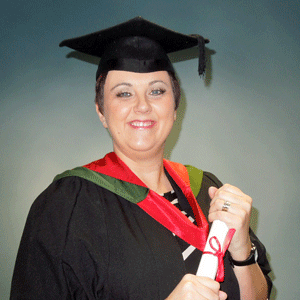
Returning to education was a massive challenge. The rest of my group (although there were only twenty of us) couldn’t believe I’d never done online learning. I graduated from university first time round in 1996! Some of the topics we covered were way out of my comfort zone.
Anatomy and physiology was a shock for me; I did GCSE Physics in 1990! However, we were a small group and all had strengths where we could support each other. There were some really tough times and there were times when I thought I wasn’t going to finish. However, I was so pleased when I did; it’s one of the things I’m most proud of.
The best thing about my job
I could go on about this forever! I realise this is a cliché, but the best part of my job is knowing I’ve helped someone.
I had a patient who was devastated after her husband died. We talked about his upcoming birthday, which she was dreading, and we talked about how she and her family could think about the happy times they had together rather than think about the circumstances of his death. When we spoke after his birthday, she said the family had done this and it was the first time she’d been able to look at his photos for the first time without crying and felt much better. There’s nothing like that feeling that you’ve been able to make that difference to someone.
I have worked with, and continue to work with, some inspirational nurses who are 100% committed to patient care. Caring, knowledgeable and amazing! I’m proud to be a nurse.
Advances in technology and care
I mentioned earlier the vital signs monitoring. I think that the systems that enable us to do this will develop and improve. For example, at the minute we are 24 hours behind the patient. In the future, I think that we will be able to do this in real time.
I genuinely feel that services need to be geared towards enabling patients to be involved in self management, including the need for more education. If patients understand the complications of a disease such as diabetes before they get to that point, they can make lifestyle choices to prevent those complications.
#hellomynameis
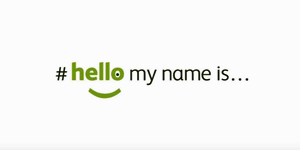
However, I think that it’s a shame that healthcare professionals have needed to be reminded about the need to focus on the patient and to introduce themselves to the patient; to me this is just common courtesy. I’m glad it’s at the top of the agenda thanks to Dr. Kate Granger; it deserves to stay there.
My nursing role models
I have worked with some amazing nurses, both as a student and as a staff nurse. I worked with an advanced nurse practitioner as a student in Accident and Emergency. During his consultation with a patient, he didn’t write anything down. He was 100% focused on what the patient was telling him. He wrote his notes after the consultation, and when he wrote his notes afterwards they were accurate because he’d been listening properly.
That’s the kind of practice that I aspire to. One of my other community mentors is a role model too; she is knowledgeable, she’s built good rapport with her patients, and she’s firm but fair with a great sense of humour.
What’s next for me and the service
I’m relatively new in this post; I’ve only been here since March so I feel that I still have a lot to learn. I’m increasing my knowledge of long-term conditions such as heart failure and COPD (chronic obstructive pulmonary disease) so that I can advise patients effectively, as well as current health promotion advice to encourage patients to make lifestyle changes if necessary. I enjoyed my community rotation and am looking forward to my next one in January.
In terms of the service, reducing hospital admissions is particularly important at this time of year given the additional winter pressures that hospitals have. We want to ensure patients can be cared for at home unless absolutely necessary, and we continue to work with other agencies to do this.
http://www.southwestyorkshire.nhs.uk/our-services/care-navigation-and-telehealth/
https://twitter.com/allofusinmind
https://www.facebook.com/allofusinmind/
http://uk.linkedin.com/company/south-west-yorkshire-partnership-nhs-foundation-trust

